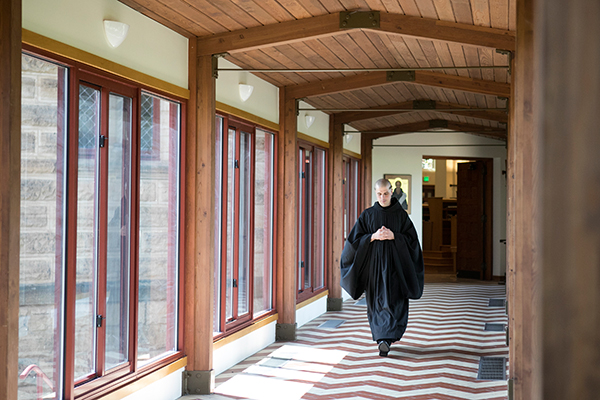Insights on Humility
Fr. Adrian Burke, OSB
Thursday, August 22, 2019

"...a monk does only what is endorsed by the common rule of the monastery and the example set by his superiors."
Rule of St. Benedict 7:55
The chapter on humility is the lengthiest of all and plays an important role in the Rule as a summary statement of the chief "ingredients" to a monastic spirituality and an attitude to embrace that is truly Christ-like.
Benedict’s insights on humility are useful, I think, for any serious Christian striving to “follow Christ” by taking up their cross daily and walking in his steps (cf. Luke 9:23 and 14:27; Mt 8:34 and 10:38).
In the second half of the Ladder of Humility, Benedict focuses on outward behaviors. These don’t make a person humble, but can serve to aid us in striving for so great a virtue. Seeing them as actions taken to climb higher can help us imitate Jesus’ own humility and outwardly train our bodies and minds to embrace a humble stance before others.
Still, it is the heart that needs to be trained above all, and the heavy lifting in that regard belongs to the Holy Spirit. Our actions indicate that humility of heart is something we want the Spirit to help us attain. If one is mindful of one’s behavior, one can gradually be transformed inwardly and – with time and lots of practice – be more naturally humble with heart, mind and body acting as one.
I quote above from the eighth rung of the ladder. Monks vow to surrender their own preferences for doing things “their way” for the sake of embracing the community’s ways. Example is given by the superiors – if they indicate that it’s important to them, then the members may more readily appropriate their place within the community by standing with others, rather than over-and-against.
Being a “body” requires that we retain our uniqueness, but at the same time adopt a collective purpose to belong to Christ as an embodied means for the Risen Lord to continue to manifest his presence in the world today.
Monks strive to control the tongues to better listen; we strive to use our sense of humor wholesomely, and not at the expense of others; we strive to speak gently and not coercively, avoiding the need to be aggressive in speaking our mind.
And, finally, the twelfth rung of the ladder is that a monk always manifests humility in his bearing,“no less than in his heart” – reinforcing the fact that the heart is where it really happens, but we can begin by striving to act in ways that accord with a genuine spirit of humility by being mindful of others first.
We don’t need to hang our heads and walk around in a mopey manner, but we avoid posturing and swagger, which are really manifestations of insecurity. The truly confident person doesn’t need swagger, nor do they need to coerce others or prove themselves. By being gentle, kind and mindful of others, they demonstrate genuine humility by standing in the truth of who they are in Christ, without fuss or a need for attention.